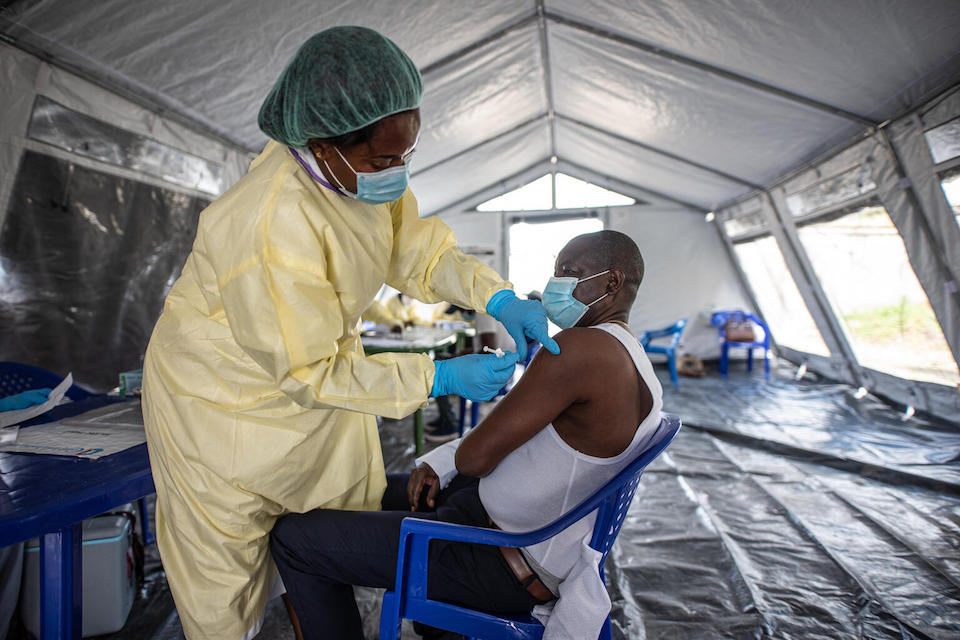Building back better from COVID-19 and building lasting peace across Africa
Statement by Minister James Duddridge at the Security Council open debate on addressing root causes of conflict while promoting post-pandemic recovery in Africa

Thank you, State Councillor Wang, for convening this timely debate.
As we’ve heard today, this devastating pandemic presents fresh challenges to building a lasting peace across the African continent. The virus indeed has disproportionately impacted those affected by conflict, particularly women, children, refugees and internally displaced persons.
The challenges of recovery are numerous and interconnected. And that’s why we must work together through a comprehensive approach across human rights, peace, security and development.
The UK has worked with all our international partners for equitable access to COVID vaccines for people around the world. Under our G7 presidency, the G7 has doubled contributions to COVAX, and we’re proud to be one of the largest bilateral donors, committing $770 million.
More than 160 million people are at risk of being excluded from these vaccination campaigns because of instability and conflict. A multilateral approach is the only viable way to ensure that rapid, equitable access to safe and effective vaccines, including in conflict affected areas through vaccination ceasefires.
However, as we consider pandemic recovery, we need to look beyond vaccines and consider how to ensure everyone - particularly women, girls, the young, the excluded - has the opportunity to build their potential. This requires increased access to healthcare and ending preventable deaths. It requires quality education, which is why the UK is part of and is indeed the largest global donor to the Global Partnership for Education, reaching 24 million children since 2015 - the majority of which are in Africa. We look forward to the Global Education Partnership’s replenishment Summit in July with our Kenyan friends, and we call on all countries to step up their efforts in this regard.
Addressing health and education shortcomings will reduce poverty, but we must also address the undeniable links between poverty and conflict. By 2030, 80 per cent of the world’s extreme poor will be living in fragile states. Climate change will continue to magnify this trend, driving food insecurity, drought and exacerbating conflict. That’s why we’ve already pledged over $15 billion of international climate finance over the next five years.
There’s a chance to support Africa not only to recover from the pandemic, but rebuild better than before. Unleashing the potential women and young people is central to this. Health and education and climate support not only will change lives for the better, but it will only do so if it’s not undermined by conflict.
So we must address the underlying grievances that cause people to take up arms. Development gains and fragile peace can be lost if large parts of the population are marginalised or human rights are not respected. That’s why in Somalia, for example, the UK places such importance of promoting full, equal and meaningful participation of women and community leaders in elections and also in peace processes.
That’s why ending horrendous levels of sexual and gender based violence that we’re witnessing in Tigray is so, so urgent.
Peace can only be built from the foundations of strong institutions, the rule of law and open, inclusive societies. The UN and African Union are working stronger together than ever before. Early interventions, including by the African Union, will need to be coupled with long-term engagement and development programmes by the UN and its partners.
We’ve seen this in Sudan, where Prime Minister Hamdok continues to make progress towards peace, prosperity and democracy.
In Mali, the UK is supporting UN stabilisation efforts and increasing the meaningful participation of women in the peace process through our peacekeeping deployment, and also by working with UN agencies to strengthen civil-military cooperation.
The UK also strongly supports the sustaining peace agenda, which builds an inclusive cross-pillar approach to peacebuilding that draws on expertise of the whole UN system. We’re proud to support the Peacebuilding Commission and Peacebuilding Fund, to which the UK has been a top donor, having donated £220 million since its inception.
To conclude, there is more to do if we’re to reduce the dangers that poverty, marginalisation and the pandemic pose to African peace and development, and global stability more generally. We need countries to come together to support an integrated approach to post-pandemic recovery, because only by working together can we address the underlying drivers of conflicts and achieve a lasting peace for Africa - a peace we all want.